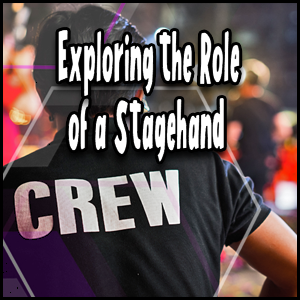
Last Updated on May 14, 2025 by LD Ryan Conlon | 🕒 9 min Read Time
Ever wondered who breathes magic into Broadway or transforms an ordinary rock concert into a psychedelic spectacle?
Take a moment to step backstage, out of the limelight, and you’ll come face to face with the unsung heroes of the entertainment world – the stagehands.
Like the intricate cogs in a vintage pocket watch, they work behind-the-scenes making sure every performance runs like clockwork.
So, who hires these wizards whose batons orchestrate theatrical miracles?
If you’re on the hunt for jobs in this adrenaline-charged industry, read on as we pull back the curtain to reveal exactly where to look.
There are several companies and organizations that frequently hire stagehands in the entertainment industry.
- Theaters: Both large and small theaters hire stagehands to assist with the setup, operation, and strike of sets and equipment for theatrical productions.
- Concert and Event Venues: Music venues, stadiums, and arenas hire stagehands to help set up and run concerts, sporting events, and other live shows.
- Production Companies: Companies that specialize in event production, audio-visual services, and live event management often employ stagehands to provide technical support for events.
- Event Planners: Event planning companies may hire stagehands to assist in the setup and teardown of various elements at corporate events, weddings, and other special occasions.
- Film and Television Productions: The film and television industry often employs stagehands to handle various behind-the-scenes tasks, including building and striking sets and assisting with lighting and sound equipment.
- Trade Shows and Conventions: Organizations that host trade shows, conventions, and expos may hire stagehands to assist with the setup and operation of booths, displays, and audio-visual equipment.
- Theme Parks and Amusement Parks: Theme parks and amusement parks may employ stagehands to maintain and operate attractions, shows, and entertainment facilities.
- Event Rental Companies: Companies that provide equipment and rental services for events may hire stagehands to help with equipment setup, operation, and takedown.
- Live Event and Technical Services Providers: Businesses specializing in technical services, such as lighting, sound, and staging, often employ stagehands to support their operations.
- Freelance and Union Workers: Many stagehands work as freelancers or belong to stagehand unions. They may be hired on a project-by-project basis by various employers in the industry.
Who Hires Stagehands?
If you’re currently considering a career as a stagehand in the entertainment industry, one of the most pressing questions on your mind is likely, “Who hires stagehands?”
Well, fear not, because there are plenty of job opportunities for skilled and dedicated individuals like yourself.
From theater venues to concert and event productions, the need for capable stagehands is abundant.
Let’s start by taking a closer look at theater venues.
These establishments serve as the backbone of the performing arts world, hosting a wide array of productions ranging from plays and musicals to dance recitals and operas.
With such diverse programming, theater venues are always on the lookout for talented stagehands who can bring their technical expertise to the table.
Whether it’s setting up intricate sets, operating lighting and sound equipment, or handling props with precision and care, stagehands play a crucial role in ensuring that performances run smoothly.
In addition to theater venues, concert and event productions also offer numerous opportunities for stagehands.
When you attend a live concert or an extravagant event, have you ever stopped to consider all the behind-the-scenes work that goes into making it happen?
From constructing massive stages to managing audiovisual systems and coordinating logistics, stagehands are essential in bringing these experiences to life.
Whether it’s an epic outdoor music festival or an intimate indoor gig, there is always a demand for skilled stagehands who can handle the fast-paced nature of live events.
But who specifically hires stagehands in these realms?
Some of the top companies known for employing stagehands include the International Alliance of Theatrical Stage Employees (IATSE), Upstage Center, Rhino Staging & Event Solutions, and Live Nation Entertainment.
These companies have established themselves as leaders in their respective fields and consistently offer excellent job opportunities for aspiring stagehands.
For example, the IATSE is renowned for its commitment to supporting workers in the entertainment industry.
With a wide network of professionals and resources, they provide stagehands with access to various job opportunities across the country.
Upstage Center and Rhino Staging & Event Solutions are also highly regarded companies that consistently hire stagehands for events and productions of all sizes.
Live Nation Entertainment, on the other hand, is a powerhouse in the music industry and manages some of the biggest concert tours and festivals around the world.
They employ a vast team of stagehands to ensure that each event runs smoothly and that audiences have an unforgettable experience.
Aside from these top companies, there are several other organizations that also hire stagehands, such as Rhino Labs, House of Blues, Charm City Run, Crew Technical Svc, Sound, and NRG Energy.
These companies offer unique opportunities in various locations across the United States, including Arizona, Nevada, Colorado, Los Angeles, Louisiana, and Georgia.
- According to Indeed.com, as of 2023, there are around 54 active job listings for stagehand jobs in the New York City Metropolitan Area – a significant portion of the industry.
- The U.S. Bureau of Labor Statistics revealed that as of 2020, over 134,000 technicians and stagehands were employed in the motion picture and video industries alone in the United States.
- Glassdoor reports show that salaries for stagehand roles can range broadly depending on experience and location, with a national average ranging from $40,000 to $120,000 annually.
Top Entertainment Companies
When it comes to finding employment as a stagehand in the entertainment industry, knowing which companies to target can greatly enhance your job search.
Aligning yourself with top entertainment companies not only increases your chances of securing rewarding positions but also enables you to accumulate valuable experiences that will propel your career forward.
One of the leading companies known for hiring stagehands is Live Nation Entertainment.
As mentioned earlier, Live Nation Entertainment is a global powerhouse in the music industry and produces some of the most iconic concerts and festivals worldwide.
By working with Live Nation, you’ll have the opportunity to be a part of these epic productions, setting up stages, managing equipment, and contributing to the overall success of each event.
Another top company in the industry is House of Blues, a renowned venue chain that hosts performances by established and emerging artists alike.
As a stagehand employed by House of Blues, you’ll be responsible for ensuring that every show runs smoothly and that performers and audiences have an unforgettable experience.
From setting up intricate lighting rigs to handling sound equipment with precision, the role of a stagehand at House of Blues is pivotal in creating a magical atmosphere for live performances.
In addition to Live Nation Entertainment and House of Blues, Rhino Staging & Event Solutions is another prominent company that hires stagehands.
Rhino Staging specializes in providing technical support and staffing solutions for concerts, festivals, corporate events, and trade shows.
By joining their team, you’ll be exposed to a wide range of events and gain valuable hands-on experience in different environments.
It’s worth noting that while these companies are certainly excellent options for aspiring stagehands, there are also countless other organizations in the entertainment industry that offer exciting job opportunities.
Whether it’s Charm City Run focusing on live sports events or Crew Technical Svc supporting film and television productions, each company brings its unique flavor to the table.
By exploring various opportunities within these organizations, you can expand your skill set and broaden your horizons as a stagehand.
So how do you navigate through this diverse landscape of top entertainment companies?
Keep in mind that career journeys will differ from person to person, depending on individual goals and interests.
It’s essential to conduct thorough research on each company you’re interested in and align yourself with those whose values and objectives resonate with your own.
Networking is also vital in this industry – reach out to professionals already working as stagehands or within the entertainment field.
Attend industry conferences or workshops where you can meet like-minded individuals and potentially establish connections that open the door to new opportunities.
By building meaningful relationships, you increase your chances of being recommended for positions within well-respected companies.
- In order to enhance your job search as a stagehand in the entertainment industry, it is important to target top companies that offer rewarding positions and valuable experiences. Live Nation Entertainment, House of Blues, and Rhino Staging & Event Solutions are three prominent companies known for hiring stagehands. These companies provide opportunities to work on iconic concerts, festivals, and events, allowing you to contribute to their success and propel your career forward. However, it is crucial to remember that there are numerous other organizations in the industry that offer exciting job opportunities. Conduct thorough research, align yourself with companies whose values resonate with your own, and network with professionals in the field to increase your chances of being recommended for positions within well-respected companies.
Opportunities at Theater Venues
If you have a passion for the theatrical arts, then working at theater venues as a stagehand could be your dream job.
The theater industry offers a wide array of opportunities for stagehands to showcase their skills and contribute to the magic that unfolds on stage night after night.
One of the main advantages of working at theater venues is the diversity of productions you’ll encounter.
From classic plays to modern musicals and everything in between, each production presents unique challenges and opportunities for stagehands.
Imagine being part of the backstage crew as the curtains rise on a stunning Broadway production or being responsible for flawlessly executing intricate set changes during a Shakespearean play.
These experiences not only provide immense satisfaction but also allow you to constantly learn and grow in your craft.
Let me share with you an anecdote from my own experience as a stagehand at a popular theater venue. During one production, we had to create a realistic rain effect on stage for a pivotal scene.
It involved carefully coordinating water flow, lighting effects, and sound cues to create a truly immersive experience for the audience.
As I stood in the wings watching the actors perform under the simulated rain, I couldn’t help but feel an incredible sense of pride knowing that my contribution helped bring that moment to life.
Aside from the thrill of being behind-the-scenes, working at theater venues also allows you to collaborate closely with talented professionals across various disciplines.
You’ll be working alongside lighting designers, sound technicians, set designers, and costume departments, all coming together like cogs in a well-oiled machine.
The collaborative nature of theater production fosters creativity and provides an opportunity to learn from experts in different fields.
Some people may argue that theater venues are only suitable for those seeking temporary employment due to the nature of most productions having limited runs.
While it’s true that some positions may be project-based or seasonal, theater venues often have multiple productions staged throughout the year.
Additionally, many venues also host touring productions and long-running shows, which provide more stable employment opportunities for stagehands.
Moreover, working at a theater venue offers a sense of community that may be harder to find in other entertainment sectors.
You become part of a dedicated team who shares a common passion for the arts.
This camaraderie fosters a supportive and nurturing environment where everyone’s contributions are valued, leading to long-lasting professional relationships and networking opportunities within the industry.
If theater venues ignite your passion for the arts, you’ll be pleased to know that there are also abundant job opportunities in the world of concerts and events.
Job Markets in Concerts & Events
Concerts and events are vibrant environments that rely heavily on the expertise of stagehands to create memorable experiences for attendees.
Whether it’s a stadium concert featuring your favorite band or an outdoor music festival attracting thousands of people, stagehands play a crucial role in ensuring the smooth operation of these events.
The concert industry offers unique challenges that require adaptability and quick thinking.
As a stagehand in this fast-paced environment, you’ll need to anticipate last-minute changes in set design, coordinate with musicians and performers, and troubleshoot technical issues on the fly.
The satisfaction derived from successfully executing these tasks amidst the excitement of live performances is unmatched.
Let me share an example to illustrate the importance of stagehands in the concert industry.
Imagine attending a large-scale music festival with multiple stages.
As you move between stages enjoying various acts, you may not realize the behind-the-scenes coordination required to ensure each performance starts on time.
Stagehands work tirelessly behind the scenes setting up equipment, managing cables, and facilitating smooth transitions between acts.
Their efforts seamlessly bring together all elements necessary for an unforgettable performance.
The event market also presents numerous opportunities for stagehands seeking versatile work experiences.
From corporate conferences to trade shows and product launches, events span various industries and require a wide range of technical skills.
As a stagehand in the events industry, you may find yourself erecting elaborate sets for a fashion show one day and constructing an immersive brand experience the next.
This diversity keeps the job fresh and exciting, allowing you to continually expand your skill set.
In terms of job prospects, the concert and events market is constantly expanding.
With the rise of music festivals and corporate events the demand for skilled stagehands is on the rise.
Major entertainment companies, production houses, and event management firms are always on the lookout for talented individuals to join their teams.
Furthermore, advancements in technology continue to shape the industry, providing new opportunities for stagehands with expertise in areas such as audio-visual technology and interactive installations.
While concert and event environments can be thrilling, they also come with their own challenges.
The fast-paced nature of these settings often means long hours and irregular schedules.
Stagehands must be prepared for physically demanding work that might involve heavy lifting, working outdoors in varying weather conditions, or navigating crowded venues.
However, for those who thrive in dynamic environments where no two days are alike, these challenges only add to the excitement of the job.
Next, let’s delve into the specific roles and responsibilities that stagehands execute across different types of productions and events.
What Roles Stagehands Execute?
Stagehands play a vital role in the success of any production, whether it’s a theater performance, a concert, or a live event.
They are the unsung heroes behind the scenes, working tirelessly to ensure that everything runs smoothly and seamlessly.
From setting up and dismantling equipment to assisting with lighting, sound, and props, stagehands are the backbone of the entertainment industry.
One of the primary roles of stagehands is to assist with the setup and dismantling of sets and equipment.
They work closely with set designers and technical directors to bring their vision to life.
With their physical strength and attention to detail, stagehands handle heavy equipment, props, and set pieces.
They carefully follow instructions to ensure that everything is placed correctly on stage, creating the desired atmosphere and setting for each production.
In addition to setting up the physical elements of a production, stagehands also play a crucial role in ensuring that all technical aspects run smoothly.
They work closely with lighting technicians, sound engineers, and audiovisual specialists to coordinate cues and transitions during performances.
For example, they might be responsible for moving lights or operating special effects equipment at the right moment to enhance the overall experience for the audience.
Stagehands also contribute significantly to maintaining the safety of performers and crew members.
They help create safe pathways backstage by managing cables and ensuring that floors are clear of hazards.
During performances or events, they remain alert and ready to respond quickly in case of any emergencies or unforeseen issues.
Their ability to think on their feet and troubleshoot problems makes them an invaluable asset in high-pressure situations.
Furthermore, stagehands often serve as assistants to other members of the production team.
They may work closely with costume designers, helping performers get dressed quickly between acts or scenes.
In some cases, they might even have direct interaction with actors or musicians while on stage during rehearsals or performances.
This close collaboration requires strong communication skills, adaptability, and a keen sense of teamwork.
Consider a stagehand’s role in a theater production.
During the run of a play, they work closely with the stage manager to ensure that props are in place, set pieces move smoothly, and any necessary scene changes occur seamlessly.
They may also be responsible for ensuring that actors have their costumes and props ready before each performance.
In one particular show, “The Phantom of the Opera,” stagehands played a pivotal role in managing the complex set changes and special effects that brought the story to life.
Without their meticulous attention to detail and expertise, the production would not have been as immersive or captivating for the audience.
Stagehands often wear many hats and adapt to various roles depending on the size and type of production.
For instance, in smaller productions with limited budgets, they may take on additional responsibilities such as operating sound or lighting equipment.
Their versatility allows them to fill gaps in the production team and ensures that performances can still go on smoothly, even with limited resources.
While some might underestimate the importance of stagehands, their impact cannot be understated.
Without their hard work behind the scenes, productions would lack the polish and professionalism that audiences have come to expect.
From Broadway shows to local community theater performances, stagehands are critical in creating memorable experiences for both performers and spectators alike.
Think of a stagehand as the cog that keeps a well-oiled machine running smoothly.
They may not always be in the spotlight, but their contributions are essential for the overall success of any production.
Just like an intricate clock where every part has its purpose, stagehands are crucial components that ensure all moving parts align cohesively.
Now that we understand the different roles stagehands execute, let’s delve into their specific responsibilities and tasks in more detail.
Responsibilities and Tasks
Stagehands have a myriad of responsibilities and tasks that they handle during different stages of a production.
From the early planning phases to the final curtain call, their behind-the-scenes efforts are integral to the overall success of any show or event.
During pre-production, stagehands work closely with the production team to understand the vision for the performance.
They assist in gathering and organizing all necessary equipment, props, and materials.
This includes ensuring that all items are safely transported to the venue and properly stored until needed.
Their organizational skills are crucial in maintaining an efficient workflow throughout the entire process.
Once on-site at the venue, stagehands participate in load-ins and set-ups.
This involves unloading equipment from trucks, assembling staging platforms, setting up lighting rigs, and arranging audiovisual components.
They meticulously follow technical riders and plans provided by the production team to ensure that every aspect aligns with the artistic direction of the show.
In addition to physical setup, stagehands are responsible for running rehearsals under the supervision of directors or stage managers.
This might involve moving set pieces, adjusting lighting cues, or prop placement based on blocking instructions.
During rehearsals, stagehands must be attentive and adaptable to accommodate any changes made by the production team or performers.
During performances or events, stagehands shift their focus toward backstage management.
They actively monitor cue sheets and collaborate with stage managers to coordinate seamless transitions between scenes or acts.
They anticipate any potential issues that might arise and are prepared to provide quick solutions to ensure uninterrupted performances.
For example, let’s consider a concert where multiple bands perform back-to-back on a festival stage.
Stagehands play a key role in swiftly changing instruments, rearranging drum kits, setting up amplifiers, and attending to any other specific needs each band may have.
Their ability to execute these tasks efficiently helps maintain a smooth flow between each act, allowing performers to stay focused on their craft.
Stagehands are also responsible for smooth load-outs and post-production cleanups.
After the final performance, they carefully pack equipment, dismantle sets, and return all rented items to their respective owners.
Their attention to detail during this crucial phase ensures that nothing is left behind and the venue is restored to its original condition.
Alongside these core responsibilities, stagehands often encounter unexpected challenges that require quick thinking and problem-solving skills.
They might need to troubleshoot technical issues, adapt to last-minute changes in the production timeline, or make on-the-spot adjustments to sets or props.
The ability to handle these situations calmly and efficiently is a testament to the resourcefulness of stagehands.
The responsibilities and tasks of stagehands may vary from production to production, but their commitment to ensuring smooth operations remains constant.
Whether it’s assisting with set construction or orchestrating intricate set changes during a live performance, stagehands serve as indispensable members of the entertainment industry.
Some may argue that advancements in technology could eventually replace certain tasks performed by stagehands.
While it’s true that automation has its place in certain areas of production, there will always be a need for human touch and adaptability behind the scenes.
Stagehands bring an unparalleled level of expertise, problem-solving abilities, and hands-on practicality that cannot be replicated by machines or software.
Just as a conductor leads an orchestra, stagehands conduct the chaotic symphony happening backstage.
Their unwavering dedication and ability to keep everything in sync ensure that each act flows seamlessly into the next—producing a cohesive masterpiece appreciated by both performers and audiences alike.
Now that we have explored the various responsibilities and tasks undertaken by stagehands let us shift our focus towards the essential skills required for a successful stagehand career.
Skills Required for a Successful Stagehand Career
When it comes to working as a stagehand in the entertainment industry, there are certain skills that are essential for achieving success.
While the specific skill set may vary depending on the type of event or venue you work in, there are some key abilities that can greatly enhance your career prospects.
Let’s delve into these skills and explore why they are crucial for aspiring stagehands.
Firstly, one of the most important skills for a stagehand is technical proficiency.
This means having a solid understanding of various technical aspects such as lighting, sound systems, rigging, and stage setups.
Being able to operate and troubleshoot different equipment effectively is crucial in ensuring smooth-running productions.
For instance, imagine being at a concert where the lights suddenly malfunction during an artist’s performance.
A skilled stagehand would be able to quickly identify and fix the problem, allowing the show to go on without any major disruptions.
Moreover, stagehands need to possess excellent teamwork and communication skills.
As part of a larger crew, you will often be collaborating with other professionals such as lighting designers, sound engineers, and stage managers.
The ability to effectively communicate your ideas and understand others’ inputs is vital in delivering cohesive productions.
Furthermore, working as a stagehand frequently involves assisting performers on stage during live events.
In these situations, clear communication becomes even more critical to ensure smooth timing and seamless transitions.
Additionally, physical fitness is an indispensable skill for stagehands.
The job often requires lifting heavy equipment, climbing rigging structures, and maneuvering quickly around the stage area.
Being physically fit enables you to perform these tasks efficiently while reducing the risk of injury.
Some may argue that modern technology has made physical strength less vital in today’s entertainment industry.
However, it is important to note that technology cannot replace the need for human labor completely, and physical fitness remains a fundamental requirement in many stagehand roles.
Furthermore, problem-solving skills are highly valued in the world of stagehands.
Events and live shows are filled with unexpected challenges and technical glitches that need to be resolved quickly.
Just like a detective solving a complex case, a skilled stagehand must have a knack for identifying problems, analyzing potential solutions, and implementing effective fixes.
This ability to think on your feet and remain calm under pressure is what sets exceptional stagehands apart from the rest of the pack.
As you can see, there is a diverse skill set required to thrive in the field of stagehand work.
From technical proficiency to teamwork, communication, physical fitness, and problem-solving abilities, each skill plays a crucial role in ensuring the success of productions in the entertainment industry.
Navigating Stagehand Job Opportunities
Now that we have explored the essential skills for a successful career as a stagehand, let’s turn our attention to how you can navigate the job market and find exciting opportunities in the field.
Whether you are just starting out or looking to advance your career, there are several strategies you can employ to uncover hidden gems and secure high-quality stagehand positions.
One effective method is to leverage your network within the entertainment industry.
Reach out to contacts you may have made during previous gigs or connect with professionals on platforms like LinkedIn.
Networking allows you to tap into insider information about upcoming events or job openings that may not be publicly advertised.
For example, imagine attending an industry mixer where you strike up a conversation with a lighting designer who happens to be working on an upcoming concert tour.
By expressing your interest in stagehand work, they may refer you or provide valuable leads that can help you land an exciting opportunity.
Another avenue worth exploring is registering with reputable staffing agencies or organizations that specialize in providing personnel for events and venues.
These agencies often have a wide network of clients and can connect you with opportunities that align with your skills and experience.
Moreover, they may offer additional resources such as training programs or certifications that can enhance your employability as a stagehand.
By partnering with a reliable staffing agency, you can streamline your job search process and increase the likelihood of finding consistent work in the industry.
While traditional job boards and online platforms are commonly used for job searching, it is essential to complement these approaches with more proactive strategies.
Consider reaching out directly to event production companies, theater venues, or concert organizers to inquire about potential openings.
By taking the initiative and showcasing your passion for stagehand work, you present yourself as a motivated and proactive candidate.
While this approach requires more effort on your part, it can be highly rewarding in terms of securing coveted opportunities that may not be widely advertised.
Additionally, volunteering your services at local theaters or community events can be an excellent way to gain hands-on experience and build connections in the industry.
Just like starting at the bottom rung of a ladder to eventually reach higher levels, volunteering allows you to showcase your commitment, work ethic, and skills to potential employers.
Often, volunteer opportunities can lead to paid positions or recommendations from industry professionals who recognize your dedication.
By adopting a multi-faceted approach that combines networking, leveraging staffing agencies, direct inquiries, and volunteering, you maximize your chances of finding stagehand jobs that align with your goals and aspirations.
Remember that persistence and patience are key virtues in navigating this competitive field.
Job Types and Experience Levels
The world of stagehand employment offers a diverse range of job types and experience levels.
This versatility ensures that aspiring stagehands can find a role that suits their skills and interests.
Whether you are just starting your journey in the industry or have years of experience under your belt, there are opportunities available to suit every level of expertise.
Entry-level positions are ideal for those who are new to the world of stagehands but possess a strong work ethic and willingness to learn.
These roles often involve assisting senior crew members with various tasks and responsibilities.
Despite starting at the bottom of the ladder, entry-level stagehands have the opportunity to gain hands-on experience and develop essential skills that will form the foundation of their career.
As stagehands gain experience and demonstrate proficiency, they can progress to more specialized roles within the industry.
These positions require a deeper understanding of technical aspects such as lighting, sound, or set design.
Technical stagehands play a vital role in ensuring that performances run smoothly and seamlessly.
Their expertise and attention to detail are crucial for creating memorable experiences for both performers and audiences alike.
Moreover, experienced stagehands may choose to pursue leadership roles within their field.
Stagehand supervisors or heads of departments oversee the entire crew and coordinate all aspects of live productions.
These individuals possess a wealth of knowledge and experience, making them instrumental in delivering successful events.
It’s worth noting that even within each job type and experience level, there is room for specialization.
For example, a stagehand with expertise in rigging may focus primarily on handling the equipment required for safely suspending lights, backdrops, or other elements from above the stage.
Meanwhile, an audio-focused stagehand may specialize in setting up sound systems and ensuring optimal audio quality during performances.
By diversifying job types and experience levels, the world of stagehand employment becomes more accessible and dynamic.
This ensures that both newcomers to the industry and seasoned professionals can find meaningful work that aligns with their interests and strengths.
Imagine starting as an eager entry-level stagehand assisting with setting up microphones for a local band’s performance at a small venue.
As you gain experience and showcase your dedication, you gradually move up to becoming the lead audio technician for large-scale concerts at renowned arenas.
The progression from being part of the supporting crew to taking on significant responsibilities demonstrates not only personal growth but also reflects the limitless potential within the world of stagehand careers.
Some may argue that pursuing a career as a stagehand limits future professional growth or restricts individuals to temporary gig-based employment.
However, this viewpoint fails to recognize the vast opportunities for advancement and stability within the industry.
With the projected growth rate of 6% from 2018 to 2028, stagehand positions offer long-term prospects.
Stagehands are an essential part of the entertainment ecosystem, ensuring that performances are executed flawlessly.
Their expertise and behind-the-scenes contributions play a crucial role in creating memorable experiences for audiences.
As the demand for live events continues to grow, so too will the need for skilled and passionate stagehands.
Just as a conductor relies on skilled musicians to bring their compositions to life, production teams rely on talented stagehands to transform their visions into reality.
Without these unsung heroes working tirelessly backstage, the magic of live performances would not be possible.
Related Posts
- Stagehand Etiquette and Professionalism: Essential Tips
- Essential Skills for Becoming a Professional Stagehand
- How to Get Started as a Stagehand Beginner’s Guide
- Union vs Non-Union Stagehand Jobs: Pros and Cons
- What is a Stagehand? Everything You Need to Know
[scriptless]
Pins for Pinterest
If you like what you see, feel free to share some love on Pinterest ❤️

Ryan Conlon is a highly experienced Corporate Freelance Lighting Designer with two decades of dedicated work in the entertainment industry. With a passion for creating captivating lighting experiences, Ryan has contributed his expertise to numerous corporate meetings, stage productions, concerts, and events throughout his career.







